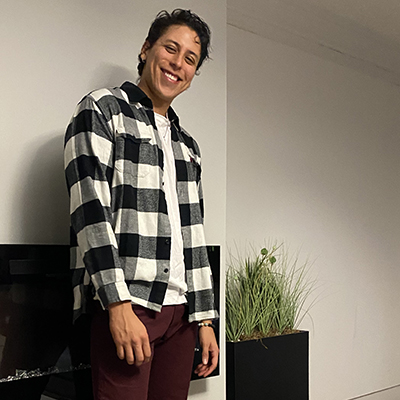Two work study students describe how the visionary Hip Hop Education program emboldened them to learn from others and reconnect with their own, unique voice. This was a meaningful opportunity for them to share their stories, to see themselves at the table.
Some opportunities open a door, set a seat at the table, at exactly the right moment in a person’s life. One visionary initiative, the Hip Hop Education program at Hart House, illustrates this idea to a tee. It had a lasting impact on two work study students in 2020-2021: Lloyd Cousins, a graduate of Woodsworth College’s Academic Bridging program, who studied Indigenous Culture and Societies; and third-year student Drew Rickard, double majoring in Philosophy and Indigenous Studies.
“This internship provided me more insight than I could have imagined,” Rickard says. Some key tasks involved in the internship included researching Indigenous Hip Hop artists to better understand community issues, current conditions and the overall landscape; building a reading list focused on connections between Indigeneity and Hip Hop; researching guests for podcasts; and coordinating community roundtables with Indigenous artists and Hip Hop practitioners.

Highlights for Rickard included working with Mi'kmaw and Northern Cree producer/engineer David Strickland and engaging with supportive Hart House staff members Zoë Dille (Manager, Learning and Community) and Marco Adamovic (Program Coordinator, Learning and Community).
“I truly am thankful for such an opportunity. This experience brought a new sense of assuredness in me,” he adds.
Cousins underscores the value of the experience: “If I had the opportunity to tell an incoming student about Hart House, I would say that it is a highly inclusive environment that cultivates a safe space for students and alumni. There’s a wide slew of programming. My hope for the future is to continue working on positive interactions with the students and staff who call Hart House their home away from home.”

Given the pandemic, the timing of the internships represented hope and a way forward.
Cousins came to the program after having studied under Jon Johnson, an assistant professor, teaching stream at Woodsworth College. Johnson is interested in projects that create mutually respectful collaborations between Indigenous communities and the University.
For Rickard, who recalls the harrowing days of Fall 2020’s all-virtual classes and finding himself in what he describes now as “a dark cave,” a turning point came in November 2020: Audrey Rochette, an Anishinaabe woman from the Waabadowgang-Whitesand First Nation in northern Ontario who was then the Indigenous partnerships and relations specialist at Woodsworth College and a presidential appointee to the Hart House Board of Stewards, alerted him to the posting for the Hip Hop Internship at Hart House.
Rickard describes how the internship “carried (him) through the dormant winter months into the supple spring air.” He also says he found the position a perfect fit due to his enduring love of music.
Both embraced music at a young age, see it as an empowering unifier
Indeed, both Rickard and Cousins grew up around music. “I began listening to rap as a child and it has followed me throughout the course of my life,” Cousins says. “I would not be the same person today, if not for the impact that rap music has had on me.”
Rickard turned to music as an emotional release. “My family was once the most revered, until everything changed when I was around 11. During those times, I found myself relishing music that was very emotive,” he explains.
Today, he equates Hip Hop with empowerment through honest expression. “Perhaps not the Oxford English speak that we most commonly identify with at U of T, but honest speak nevertheless. Hip Hop expresses what a lot of us, removed from [certain] realities, cannot see.”

Cousins sees music as a unifier of people. Of rap music in particular, he says, “It allows [artists] an easy way to tell their story in the hopes that others will hear it and be able to relate.”
Asked to consider how music can better amplify the voices of Indigenous communities, Cousins adds: “I would like to see a further emphasis on traditional elements of Aboriginal culture, such as drumming, powwow dances and First Nations language, being incorporated into rap. This would be a great way to spread the culture.”
Hip Hop internship builds confidence
The internship with the Hart House Hip Hop Education program helped both Cousins and Rickard reconnect with their roots and gain confidence in their abilities.
“I was reminded that I could empower myself, rise to the occasion and take advantage of the opportunity before me. It was a pleasure to organize dialogues, express myself, learn from those who have travelled this path before me,” Rickard says.
The experience also reinforced what he says he knew from a long time ago: “I can still learn, play and tune my own instruments. I got back to my roots and remembered who I was and what I was capable of accomplishing. If there is anything that this year has proven, it’s that we need self-expression more than anything. We all want to be heard.”
Inspired by his experience, Cousins plans to continue his work in Hip Hop “through a critical examination of the historical origins of the culture and how technological advancement in the information age can expand the influence [of Hip Hop] globally.”
Clearly, the internship — an example of experiential education at its best — offered both Cousins and Rickard an opportunity to innovate and to grow both personally and professionally. Buoyed by their experiences, Cousins and Rickard will, no doubt, continue to find new avenues and opportunities to express themselves and to make their mark.
Learn more about Hart House’s Hip Hop Education program.

